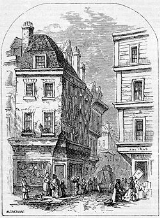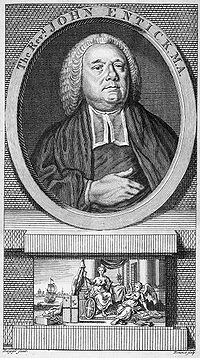
Entick v Carrington
Encyclopedia
Entick v Carrington [1765] EWHC KB J98 is a leading case in English law
establishing the civil liberties
of individuals and limiting the scope of executive
power. The case has also been influential in other common law
jurisdictions and was an important motivation for the Fourth Amendment to the United States Constitution
. It is famous for the dictum of Camden LJ: "If it is law, it will be found in our books. If it not to be found there, it is not law."
 On 11 November 1762, the King's Chief Messenger Nathan Carrington, and three other King's messengers, James Watson, Thomas Ardran, and Robert Blackmore broke into the home of the Grub-street
On 11 November 1762, the King's Chief Messenger Nathan Carrington, and three other King's messengers, James Watson, Thomas Ardran, and Robert Blackmore broke into the home of the Grub-street
writer, John Entick
(1703?-1773), in the parish
of St Dunstan, Stepney
, "with force and arms" and seized Entick's private papers. Entick, an associate of John Wilkes
, was arrest
ed. Also arrested that day was a lawyer, Arthur Beardmore. The King's messengers were acting on the orders of Lord Halifax, newly appointed Secretary of State for the Northern Department
, "to make strict and diligent search for . . . the author, or one concerned in the writing of several weekly very seditious papers intitled, 'The Monitor or British Freeholder, No 357, 358, 360, 373, 376, 378, and 380'".
Entick sought judgment against Carrington and his colleagues who argued that they acted upon Halifax's warrant. A jury
returned a special verdict finding that the defendants had broken into Entick's home "with force and arms" and searched for and taken away some of his private papers.
, the Chief Justice of the Common Pleas
. Camden held that Halifax had no right under statute
or under precedent
to issue such a warrant. In the most famous passage he stated:
Hence Lord Camden ruled, as later became viewed as a general principle, that the state may do nothing but that which is expressly authorised by law, while the individual may do anything but that which is forbidden by law.
.
It was also part of the background to the Fourth Amendment to the United States Constitution
and was described by the Supreme Court of the United States
as a "great judgment, one of the landmarks of English liberty, one of the permanent monuments of the British Constitution," and a guide to an understanding of the Fourth Amendment.
English law
English law is the legal system of England and Wales, and is the basis of common law legal systems used in most Commonwealth countries and the United States except Louisiana...
establishing the civil liberties
Civil liberties
Civil liberties are rights and freedoms that provide an individual specific rights such as the freedom from slavery and forced labour, freedom from torture and death, the right to liberty and security, right to a fair trial, the right to defend one's self, the right to own and bear arms, the right...
of individuals and limiting the scope of executive
Executive (government)
Executive branch of Government is the part of government that has sole authority and responsibility for the daily administration of the state bureaucracy. The division of power into separate branches of government is central to the idea of the separation of powers.In many countries, the term...
power. The case has also been influential in other common law
Common law
Common law is law developed by judges through decisions of courts and similar tribunals rather than through legislative statutes or executive branch action...
jurisdictions and was an important motivation for the Fourth Amendment to the United States Constitution
Fourth Amendment to the United States Constitution
The Fourth Amendment to the United States Constitution is the part of the Bill of Rights which guards against unreasonable searches and seizures, along with requiring any warrant to be judicially sanctioned and supported by probable cause...
. It is famous for the dictum of Camden LJ: "If it is law, it will be found in our books. If it not to be found there, it is not law."
Facts

Grub Street
Until the early 19th century, Grub Street was a street close to London's impoverished Moorfields district that ran from Fore Street east of St Giles-without-Cripplegate north to Chiswell Street...
writer, John Entick
John Entick
John Entick was an English schoolmaster and author. He was largely a hack writer, working for Edward Dilly, and he padded his credentials with a bogus M.A. and a portrait in clerical dress; some of his works had a more lasting value...
(1703?-1773), in the parish
Parish
A parish is a territorial unit historically under the pastoral care and clerical jurisdiction of one parish priest, who might be assisted in his pastoral duties by a curate or curates - also priests but not the parish priest - from a more or less central parish church with its associated organization...
of St Dunstan, Stepney
St Dunstan's, Stepney
St Dunstan's, Stepney is an Anglican Church which stands on a site which has been used for Christian worship for over a thousand years. It is located in Stepney High Street, in Stepney, London Borough of Tower Hamlets.-History:...
, "with force and arms" and seized Entick's private papers. Entick, an associate of John Wilkes
John Wilkes
John Wilkes was an English radical, journalist and politician.He was first elected Member of Parliament in 1757. In the Middlesex election dispute, he fought for the right of voters—rather than the House of Commons—to determine their representatives...
, was arrest
Arrest
An arrest is the act of depriving a person of his or her liberty usually in relation to the purported investigation and prevention of crime and presenting into the criminal justice system or harm to oneself or others...
ed. Also arrested that day was a lawyer, Arthur Beardmore. The King's messengers were acting on the orders of Lord Halifax, newly appointed Secretary of State for the Northern Department
Secretary of State for the Northern Department
The Secretary of State for the Northern Department was a position in the Cabinet of the government of Great Britain up to 1782. Before the Act of Union, 1707, the Secretary of State's responsibilities were in relation to the English government, not the British. Even after the Union, there was...
, "to make strict and diligent search for . . . the author, or one concerned in the writing of several weekly very seditious papers intitled, 'The Monitor or British Freeholder, No 357, 358, 360, 373, 376, 378, and 380'".
Entick sought judgment against Carrington and his colleagues who argued that they acted upon Halifax's warrant. A jury
Jury (England and Wales)
In the legal jurisdiction of England and Wales, there is a long tradition of jury trial that has evolved over centuries.-History:The English jury has its roots in two institutions that date from before the Norman conquest in 1066...
returned a special verdict finding that the defendants had broken into Entick's home "with force and arms" and searched for and taken away some of his private papers.
Judgment
The trial took place in Westminster Hall presided over by Lord CamdenCharles Pratt, 1st Earl Camden
Charles Pratt, 1st Earl Camden was an English lawyer, judge and Whig politician who was first to hold the title of Earl of Camden...
, the Chief Justice of the Common Pleas
Chief Justice of the Common Pleas
The Court of Common Pleas, also known as the Common Bench or Common Place, was the second highest common law court in the English legal system until 1880, when it was dissolved. As such, the Chief Justice of the Common Pleas was one of the highest judicial officials in England, behind only the Lord...
. Camden held that Halifax had no right under statute
Statute
A statute is a formal written enactment of a legislative authority that governs a state, city, or county. Typically, statutes command or prohibit something, or declare policy. The word is often used to distinguish law made by legislative bodies from case law, decided by courts, and regulations...
or under precedent
Precedent
In common law legal systems, a precedent or authority is a principle or rule established in a legal case that a court or other judicial body may apply when deciding subsequent cases with similar issues or facts...
to issue such a warrant. In the most famous passage he stated:
Hence Lord Camden ruled, as later became viewed as a general principle, that the state may do nothing but that which is expressly authorised by law, while the individual may do anything but that which is forbidden by law.
Significance
The judgment established the limits of executive power in English law, that an officer of the state could only act lawfully in a manner prescribed by statute or common lawCommon law
Common law is law developed by judges through decisions of courts and similar tribunals rather than through legislative statutes or executive branch action...
.
It was also part of the background to the Fourth Amendment to the United States Constitution
Fourth Amendment to the United States Constitution
The Fourth Amendment to the United States Constitution is the part of the Bill of Rights which guards against unreasonable searches and seizures, along with requiring any warrant to be judicially sanctioned and supported by probable cause...
and was described by the Supreme Court of the United States
Supreme Court of the United States
The Supreme Court of the United States is the highest court in the United States. It has ultimate appellate jurisdiction over all state and federal courts, and original jurisdiction over a small range of cases...
as a "great judgment, one of the landmarks of English liberty, one of the permanent monuments of the British Constitution," and a guide to an understanding of the Fourth Amendment.

